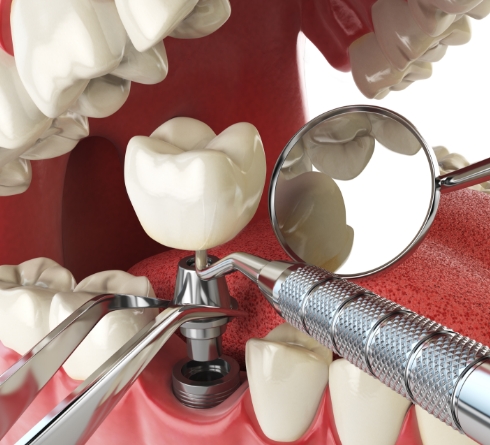Dental Implants Staten Island
Rebuild Your Smile for Life
While dentures and dental bridges are both capable of filling the gaps after tooth loss, they don’t address the missing roots of the teeth. But with dental implants, the Staten Island Oral Surgery Center can replace the entire tooth and create the foundation of a long-lasting smile. Several dentists and doctors have come to rely on us to serve their patients who could benefit from dental implants in Staten Island, and that’s thanks to the quality of our care as well as the level of our customer service. And while we happily accept referrals, individuals can also come to us directly. To get in contact with Dr. G and our team, simply click here to reach out.
Why Choose Staten Island Oral Surgery Center for Dental Implants?
- State-of-the-Art 3D Cone Beam Scanner
- Dentist with 15+ Years of Oral Surgery Expertise
- In-House Dental Financing Available
What Are Dental Implants?

These prosthetic tooth replacements are composed of small cylindrical posts made from titanium – a material that is designed to integrate with organic bone and tissue. After they are inserted into the jaw via oral surgery, they become part of the bone through a process called osseointegration. Once they’re placed, implants are strong enough to hold dental restorations entirely on their own, just like real tooth roots hold natural teeth.
The 4-Step Dental Implant Process

Dr. G has placed over 2,000 dental implants throughout his career, so he has developed a reliable and streamlined process that can also be personalized to fit each patient’s situation. While your treatment plan will be yours and yours alone, getting your new teeth will involve four basic steps:
- Consultation – You’ll sit down with Dr. G, discuss your goals, and he’ll perform an oral exam. Based on his observations and your input, you both can decide if implants would be a good fit for you.
- Surgery – If you choose to proceed, Dr. G will place your implants at precise points in your jaw while ensuring you remain comfortable the entire time.
- Osseointegration – Over the next three to six months, your implants will join with your jawbone thanks to osseointegration. They will then be topped with abutments, which will connect the posts to your restoration(s).
- Restoration – Finally, your dentist will attach your crown, bridge, or denture to your implants, completing your revitalized smile.
Benefits of Dental Implants

- Stronger biting force – Dental implants offer a level of chewing power way beyond bridges or dentures thanks to their increased support and stability.
- Always secure – There’s no need to worry about your new teeth shifting out of place thanks to their titanium anchors.
- Easy maintenance – To keep implants clean, simply brush and floss them as normal. There’s no need to remove them like dentures.
- Long-term solution – With a tooth replacement designed to last 30 years and even longer, patients can trust their results to stand the test of time.
Who Dental Implants Can Help
Dental implants are incredibly versatile. Before you begin treatment, it’s important that we take the time to ensure there is enough available bone tissue to support implants. To confirm this, we’ll measure your jawbone density, treat any gum disease that could cause them to fail, and confirm that no decay is present. After your mouth is ready, we’ll begin the planning process, which starts by determining exactly how many teeth need to be brought back.
Missing One Tooth

To replace a tooth without having to modify your existing enamel, we can use a single dental implant instead of a dental bridge. After the implant has fused with the bone and the gum tissue has healed, the post can be covered with a crown that matches the rest of the teeth.
Missing Multiple Teeth

If you want to replace multiple individual teeth throughout your mouth, we can do so with dental implants. However, if you have consecutive teeth that are missing, we can combine a pair of dental implants with a bridge that’s designed to attach to them, offering a more cost-effective and conservative solution.
Missing All of Your Teeth

By attaching a denture to a set of dental implants, we can make them much stronger and more stable compared to a removable prosthetic. This means when someone chews tougher foods or speaks, they can expect their teeth to remain rock-solid.
Learn More About Implant Dentures
Learn More About All-On-4
Understanding the Cost of Dental Implants

Before dental implant treatment begins, we want to break down the associated costs and the most notable factors that influence the overall price. After an initial consultation, we’ll provide an estimate and do everything we can to help lower a patient’s out-of-pocket costs.
Preliminary Treatments & Dental Implant Surgery

While some patients may only need a single implant, others may need multiple to restore their entire smile. With more dental implants comes a more complex surgery and potentially more appointments needed before treatment is complete, leading to a higher cost. Additionally, those who need bone grafts or gum therapy will also need to pay for these treatments to ensure the success of their implants.
The Parts of Your Dental Implant

On top of the number of implants received, the type of material used to create the implant (i.e., titanium vs. zirconia) can also influence the final cost. In some ways, dental implants could be compared to different makes and models of cars. Some may last longer or function better than others depending on the materials used to create them. With that said, Dr. G is always very clear about why he uses the implants he does, so feel free to ask him about all of these details before the procedure.
Final Dental Implant Restoration

If you need a single implant placed, you only need a dedicated crown to cover it. However, multiple dental implants need more complex restorations, such as dental bridges and dentures designed to attach to dental implants.
Does Dental Insurance Cover Dental Implants?

Most dental insurance plans don’t offer coverage for dental implants mainly because they are not considered a medically necessary treatment. However, some exceptions allow for partial coverage of specific aspects. During your consultation, we’ll be glad to go over your insurance benefits and help you determine which phases of care could be covered, such as the restoration itself or any preliminary treatment needed before implants can be placed.
Making Dental Implants Affordable

While our office is in-network with many major dental insurance providers, we understand that not everyone uses a dental plan to pay for their oral healthcare. In this instance, you can take advantage of our other financing solutions.
For example, you can apply for CareCredit, a third-party financing option that allows for monthly installments on dental care. Or, our practice is also able to accept medical insurance, which may offer coverage in certain situations.
Dental Implant FAQs
Can I Take Dental Implants Out?
No, you cannot take dental implants out yourself. They are designed to merge with the jawbone and essentially become a part of your own anatomy. Once this fusion process is complete, only an implant dentist on Staten Island can remove a dental implant. That being said, if you’re getting an implant denture, you can choose to have your prosthetic fixed in place or be removable for cleaning purposes.
Do Dental Implants Feel Natural?
Yes! After your implants have gone through the osseointegration process, they will feel exactly like the roots of your real teeth.
Are Dental Implants Safe?
Decades of clinical research have proven dental implants to be an effective and safe tooth replacement, provided they are placed by a trained professional. Even after 10+ years, more than 95% of dental implant patients are still enjoying their new teeth to the fullest.
The only thing to keep in mind is that patients with certain health conditions, such as low jawbone density, gum disease, diabetes, or cancer, may have an increased risk of complications after dental implant surgery. That’s why Dr. G will be sure to discuss your medical history and how we can reduce your risks beforehand.
Can Dental Implants Get Cavities?
Unlike real tooth enamel, the materials that dental implants are made from do not break down when exposed to acids produced by harmful oral bacteria. As a result, dental implants cannot get cavities. However, you’ll still need to brush and floss them; poor oral hygiene can lead to gum disease, which may cause your implants to fail.
Are Dental Implants an Eligible FSA Expense?
Because dental implants are usually considered a restorative solution that improves your oral health, they are often eligible for FSA reimbursement. However, most FSAs place a limit on the amount of money that you can use each year. Our team can look over the details of your FSA and help you find ways to make dental implants on Staten Island affordable for you.
